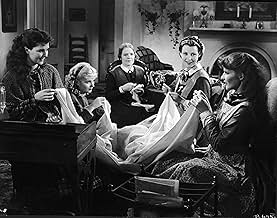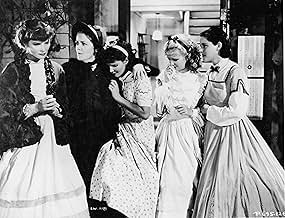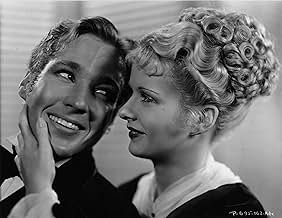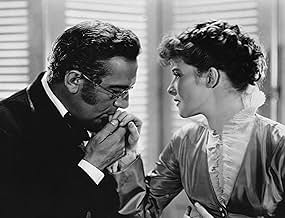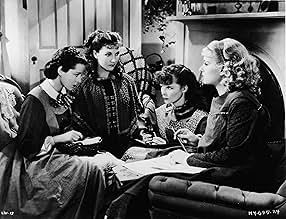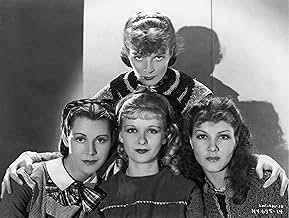CALIFICACIÓN DE IMDb
7.2/10
8.3 k
TU CALIFICACIÓN
Una crónica de la vida de un grupo de hermanas que crecieron en la América del siglo XIX.Una crónica de la vida de un grupo de hermanas que crecieron en la América del siglo XIX.Una crónica de la vida de un grupo de hermanas que crecieron en la América del siglo XIX.
- Dirección
- Guionistas
- Elenco
- Ganó 1 premio Óscar
- 7 premios ganados y 4 nominaciones en total
John Lodge
- Brooke
- (as John Davis Lodge)
Samuel S. Hinds
- Mr. March
- (as Samuel Hinds)
Nina Borget
- Housekeeper
- (sin créditos)
Francesca Braggiotti
- Dance Teacher
- (sin créditos)
Luke Cosgrave
- Old Man
- (sin créditos)
Opiniones destacadas
Having grown up with the Technicolor version of the 40s with a young Liz Taylor and a perky June Allyson, I was pleased to find this was just as good a version, better in many ways. Katharine Hepburn, as you might expect, is wonderful as the tomboy Jo March, who finds responsibility after a lifetime of woe for the family. Other cast stand-outs include Edna May Oliver as Aunt March. Laurie is a bit of a wet fish though. Both early versions are much, much better than the Winona Ryder one of the 90s, which was a sentimental Hollywood nostalgia trip which just didn't work. I'm still split between the two early ones but this is a definite favourite and I'd highly recommend it.
Little Women (1933)
A fairly lavish affair, with one of my favorite directors, George Cukor, making the most of his growing fame as a "woman's director." Of course, the leads here are four girls and their mother, among the children the rising star, Katherine Hepburn, in her second film (after Bill of Divorcement, also by Cukor, and a better film in many ways).
The standards here are high, the acting solid, the sets uncompromised. The plot is very goody-goody, for lack of a better word. There is a lot of family sweetness, growing young love affairs, charity to the poor, and a feeling of life being simply terrific, whatever its worries (worries like the Civil War, raging quietly in the background, never seen and rarely felt).
Cukor makes the most of Alcott's novel, I think, and Hepburn is wonderful, with all the hints of her real greatness on screen to come. The basic structure of the plot (or plots) is how each girl matures, overcoming personality flaws to become truly admirable people. It might be frustrating that human flaws are simply to be overcome, but we shouldn't resent a little optimism, and reaching higher goals, now and then. A heartfelt and really well made American drama. And I admit freely, I cried several times. That's better than any words.
A fairly lavish affair, with one of my favorite directors, George Cukor, making the most of his growing fame as a "woman's director." Of course, the leads here are four girls and their mother, among the children the rising star, Katherine Hepburn, in her second film (after Bill of Divorcement, also by Cukor, and a better film in many ways).
The standards here are high, the acting solid, the sets uncompromised. The plot is very goody-goody, for lack of a better word. There is a lot of family sweetness, growing young love affairs, charity to the poor, and a feeling of life being simply terrific, whatever its worries (worries like the Civil War, raging quietly in the background, never seen and rarely felt).
Cukor makes the most of Alcott's novel, I think, and Hepburn is wonderful, with all the hints of her real greatness on screen to come. The basic structure of the plot (or plots) is how each girl matures, overcoming personality flaws to become truly admirable people. It might be frustrating that human flaws are simply to be overcome, but we shouldn't resent a little optimism, and reaching higher goals, now and then. A heartfelt and really well made American drama. And I admit freely, I cried several times. That's better than any words.
Few would deny the powerful presence of Katherine Hepburn in any movie she ever made. In this first screen adaptation with sound of Louisa May Alcott's famous novel, Hepburn IS the movie. That is to say, her part, her lines, her camera time seem to surpass the combined times of all the rest of the cast. While that may be as one would expect for many stories – a star or hero being the focal point of a whole work, this film, based on this book, was supposed to be about several "little women." So, most of the rest of the characters in the film – save a neighbor male friend, really get short shrift. For that reason, and a few others I'll mention, I think this rendition falls short of the interesting story told in the book.
I would like to have seen more development of the sisters than this film has. The later remake – 1949's MGM production, does flesh out all the characters more. The problem with the overly heavy emphasis on the one character in this first movie is that the audience doesn't get much of a sense of who are the rest of the members of the family. So we can't so readily experience the ups and downs, the emotions, the tragedy and love felt between the sisters and their mother.
Hepburn does a very good Jo, but not great. I think her efforts to be the tomboy were overdone in a few instances, which only drew my attention to this aspect of her role. She didn't seem to come by it naturally. One example was when she spoke a couple of times, acting and deliberately mimicking a deep-throated guttural voice for a man. At other times, she seemed to push it a bit and overact in flamboyance of tom-boyish behavior.
There were no other notable performances by other cast members. Paul Lukas as Professor Bhaer and Douglas Montgomery as Laurie were good. Most of the rest were just OK or non-descript. One member was just not right for the role of Marmee. Spring Byington brought no depth or real feel to the role that the viewer could sense. But, then, the film just seemed to glide over the lesser roles.
"Little Women" is a good story in the American library, and this film is enjoyable to watch. But, for a much more involving and endearing film, be sure to see the 1949 rendition by MGM.
I would like to have seen more development of the sisters than this film has. The later remake – 1949's MGM production, does flesh out all the characters more. The problem with the overly heavy emphasis on the one character in this first movie is that the audience doesn't get much of a sense of who are the rest of the members of the family. So we can't so readily experience the ups and downs, the emotions, the tragedy and love felt between the sisters and their mother.
Hepburn does a very good Jo, but not great. I think her efforts to be the tomboy were overdone in a few instances, which only drew my attention to this aspect of her role. She didn't seem to come by it naturally. One example was when she spoke a couple of times, acting and deliberately mimicking a deep-throated guttural voice for a man. At other times, she seemed to push it a bit and overact in flamboyance of tom-boyish behavior.
There were no other notable performances by other cast members. Paul Lukas as Professor Bhaer and Douglas Montgomery as Laurie were good. Most of the rest were just OK or non-descript. One member was just not right for the role of Marmee. Spring Byington brought no depth or real feel to the role that the viewer could sense. But, then, the film just seemed to glide over the lesser roles.
"Little Women" is a good story in the American library, and this film is enjoyable to watch. But, for a much more involving and endearing film, be sure to see the 1949 rendition by MGM.
The film might be more accurately titled "Little Woman", with Katherine Hepburn seizing the lead role, and never letting go. Otherwise, it's the story of four "Little Women" growing up, and finding love's direction. Hepburn (she's Jo) is sister to Joan Bennett (she's Amy), Jean Parker (she's Beth), and Frances Dee (she's Meg). Of their suitors, Douglass Montgomery (he's Laurie) gets the most action.
Ms. Bennett steals the actual acting honors with a performance that is natural and consistent; her voice and mannerisms are appropriately girlish, young womanish and, selfish. Ms. Hepburn plays girlish like she's had too many cups of coffee; additionally, she never looks even remotely "tomboyish"; looking, instead, like a ravishingly made-up MGM movie star. Ms. Parker rises out of her sick bed like a zombie, but is okay in other scenes.
Watching Hepburn being romanced by Mr. Montgomery and Paul Lukas is unnerving. The story does have some reasons to watch, however. The production is obviously top-of-the-line. Hepburn may not be in her best role, but it's not awful; she slows down and gets better after her character grows older. The script has well-written characters - Jo, Amy, and Laurie - who illustrate a sweet story of family, love, and friendship.
******* Little Women (11/16/33) George Cukor ~ Katharine Hepburn, Joan Bennett, Douglass Montgomery, Paul Lukas
Ms. Bennett steals the actual acting honors with a performance that is natural and consistent; her voice and mannerisms are appropriately girlish, young womanish and, selfish. Ms. Hepburn plays girlish like she's had too many cups of coffee; additionally, she never looks even remotely "tomboyish"; looking, instead, like a ravishingly made-up MGM movie star. Ms. Parker rises out of her sick bed like a zombie, but is okay in other scenes.
Watching Hepburn being romanced by Mr. Montgomery and Paul Lukas is unnerving. The story does have some reasons to watch, however. The production is obviously top-of-the-line. Hepburn may not be in her best role, but it's not awful; she slows down and gets better after her character grows older. The script has well-written characters - Jo, Amy, and Laurie - who illustrate a sweet story of family, love, and friendship.
******* Little Women (11/16/33) George Cukor ~ Katharine Hepburn, Joan Bennett, Douglass Montgomery, Paul Lukas
This satisfying movie adaptation of "Little Women" features a strong cast and a production that was quite solid for 1933. While a glance at the story outline might give the impression that it is simplistic or childlike, that is far from the case. The novel offers well-defined characters and many situations that bring out worthwhile insights into the characters and into life in general. While neither this nor the other movie versions of the story have the same thematic depth, this version effectively presents enough of the material in a thoughtful and entertaining way.
Katherine Hepburn heads the cast, and gives plenty of life to Jo. Naturally she gets the main focus, but the other sisters and the secondary characters also get some good moments, and most of them get a chance to steal a scene or two. Henry Stephenson and Douglas Montgomery get a number of good scenes as the March family's neighbors. Edna May Oliver is well cast, and it's only too bad that she did not get a couple more scenes. Paul Lukas makes Professor Baer come alive. By no means least are Jean Parker, Frances Dee, and Joan Bennett as Beth, Meg, and Amy.
It is often easy to tell when the movie was made, most especially because of the sound. But actually the production is better technically and artistically than are most movies of the early 1930s. Several of the sets are particularly well done, creating just the right atmosphere for their scenes. Director George Cukor puts it all together nicely.
This is the kind of movie that is generally out of style at present, because it lacks the kind of self-indulgent material and the self-absorbed style that so unduly impress many of today's movie fans. But the only genuine weakness is that it has a few technical limitations, most of which are common to many films of its era.
What this adaptation does offer is a sympathetic and sometimes insightful look at the lives of some ordinary but strong persons, who are brought to life by a good cast and a director who seemed himself to care about the characters.
Katherine Hepburn heads the cast, and gives plenty of life to Jo. Naturally she gets the main focus, but the other sisters and the secondary characters also get some good moments, and most of them get a chance to steal a scene or two. Henry Stephenson and Douglas Montgomery get a number of good scenes as the March family's neighbors. Edna May Oliver is well cast, and it's only too bad that she did not get a couple more scenes. Paul Lukas makes Professor Baer come alive. By no means least are Jean Parker, Frances Dee, and Joan Bennett as Beth, Meg, and Amy.
It is often easy to tell when the movie was made, most especially because of the sound. But actually the production is better technically and artistically than are most movies of the early 1930s. Several of the sets are particularly well done, creating just the right atmosphere for their scenes. Director George Cukor puts it all together nicely.
This is the kind of movie that is generally out of style at present, because it lacks the kind of self-indulgent material and the self-absorbed style that so unduly impress many of today's movie fans. But the only genuine weakness is that it has a few technical limitations, most of which are common to many films of its era.
What this adaptation does offer is a sympathetic and sometimes insightful look at the lives of some ordinary but strong persons, who are brought to life by a good cast and a director who seemed himself to care about the characters.
¿Sabías que…?
- TriviaKatharine Hepburn asked costume designer Walter Plunkett to copy a dress her maternal grandmother wore in a tintype photograph.
- ErroresIn the Christmas play when the prop tower falls down, Jo's lips aren't moving when she says "Everything is all right."
- Citas
Beth March: You're old enough now to leave off boyish tricks and behave better, Josephine. Now you are so tall and turn up your hair, you must remember you're a young lady.
Jo March: No, l'm not. And if turning up my hair makes me so, l'll wear it down till l'm a hundred!
- Créditos curiososPaul Lukas as Professor Bher is not listed in the closing credits.
- Versiones alternativasOlder video and television prints remove the original RKO logo in the opening and replace it with the one from Selznick International.
- ConexionesFeatured in David O. Selznick: 'Your New Producer' (1935)
- Bandas sonorasThe Girl I Left Behind Me
(uncredited)
Traditional
Played during the opening scene
Selecciones populares
Inicia sesión para calificar y agrega a la lista de videos para obtener recomendaciones personalizadas
Detalles
- Fecha de lanzamiento
- País de origen
- Idiomas
- También se conoce como
- Little Women
- Locaciones de filmación
- Providencia Ranch, Hollywood Hills, Los Ángeles, California, Estados Unidos(exterior of March house)
- Productora
- Ver más créditos de la compañía en IMDbPro
Taquilla
- Presupuesto
- USD 424,000 (estimado)
- Tiempo de ejecución1 hora 55 minutos
- Relación de aspecto
- 1.37 : 1
Contribuir a esta página
Sugiere una edición o agrega el contenido que falta


